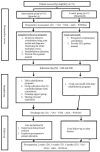The Effects of a Patient-Specific Integrated Education Program on Pain, Perioperative Anxiety, and Functional Recovery following Total Knee Replacement
- PMID: 35629142
- PMCID: PMC9146256
- DOI: 10.3390/jpm12050719
The Effects of a Patient-Specific Integrated Education Program on Pain, Perioperative Anxiety, and Functional Recovery following Total Knee Replacement
Abstract
The perioperative care of patients undergoing total knee arthroplasty (TKA) affects functional recovery and clinical outcomes. This study aims to introduce a patient-specific integrated education program (IEP) into the TKA clinical pathway and to evaluate patient outcomes between the intervention and control groups. We performed a two-site, two-arm, parallel-prospective controlled trial. The experiment group received an IEP incorporating verbal preoperative education, prehabilitation, multidisciplinary personalized rehabilitation during hospitalization, and supervised self-executed home-based exercise after discharge. The control group received regular TKA clinical care. We monitored the pain intensity, anxiety scores, and functional scores at six time points from the pre-operation interview to 3 months post-operation. The pain score was significantly decreased in the IEP group during hospitalization (p < 0.01) and before discharge (p < 0.05). The anxiety status was also improved after intervention in terms of state and trait anxiety inventory scores (p < 0.001) during hospitalization. The patient-reported (WOMAC) or physician-reported (American Knee Society Score) functional scores (p < 0.01 at most of the time points) all improved significantly under hospitalization. We found that the patient-specific IEP combining preoperative education, prehabilitation, the in-hospital group education class, and postoperative care navigation is effective in reducing postoperative pain, decreasing perioperative anxiety, and facilitating functional recovery following TKA.
Keywords: integrated education; knee osteoarthritis; prehabilitation; total knee arthroplasty.
Conflict of interest statement
Sung-Yen Lin. or any member of their immediate family have no funding or commercial associations (e.g., consultancies, stock ownership, equity interest, patent/licensing arrangements) that might pose a conflict of interest in connection with the submitted article. The funders had no role in the design of the study; in the collection, analyses, or interpretation of data; in the writing of the manuscript, or in the decision to publish the results.
Figures






References
-
- Culliford D., Maskell J., Judge A., Cooper C., Prieto-Alhambra D., Arden N.K., COASt Study Group Future projections of total hip and knee arthroplasty in the UK: Results from the UK Clinical Practice Research Datalink. Osteoarthr. Cartil. 2015;23:594–600. doi: 10.1016/j.joca.2014.12.022. - DOI - PubMed
Grants and funding
LinkOut - more resources
Full Text Sources

